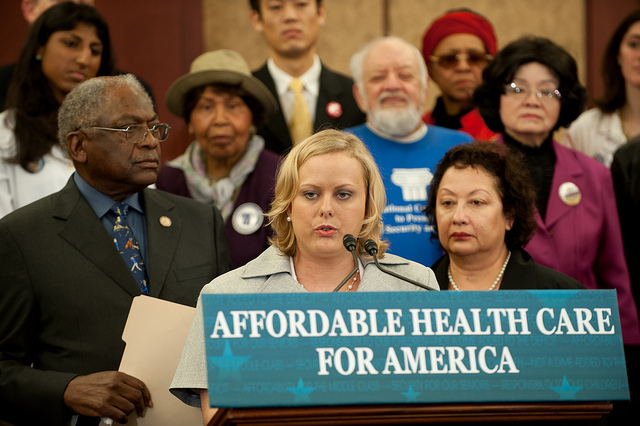
While some consider the law an overstep of the federal government, others consider it a necessary reform to ensure that all Americans have access to affordable health care. No matter which side of the divide you’re on (or even if you’re not sure what to think), the Affordable Care Act affects your health care coverage whether you like it or not. Rather than taking an ideological stance, it’s important to highlight some of the changes that have already happened as a result of the law, as well as some upcoming changes twenty-somethings in particular ought to be aware of.
The law’s full name is the Patient Protection and Affordable Care Act, or PPACA, but it often goes by the Affordable Care Act or, more colloquially, “Obamacare.” The ACA was signed into law by the President over three years ago in March 2010. It is the biggest overhaul of the U.S. healthcare system since 1965, when the government-subsidized health insurance programs, Medicare (for those 65 and older) and Medicaid (for low-income individuals and families), were introduced.
The ACA was created with the goal of increasing the quality and affordability of health insurance, expanding insurance coverage to all uninsured Americans, and reducing the now skyrocketing cost of health care.
As with any new government policy, implementation is a sluggish process. We have seen some of the new changes take shape already, but others are still on their way.
Ch-ch-ch-changes
Have you noticed that Starbucks and McDonald’s now include calorie information on their menus? This is a result of the ACA, which requires chain restaurants and food vendors with twenty or more locations to display the caloric content of their foods. The goal is to make customers more mindful of their food choices and to give companies an incentive to provide lower-calorie options. It’s possible that this regulation will actually have an impact; a 2011 Stanford study shows Starbucks customers in New York City (the first place to display calorie amounts), purchased 6 percent fewer calories per visit where the calorie amounts were posted.
However, special interests have been getting in the way of the FDA’s issuance of official label regulations, so it may be awhile before we see calorie amounts listed at movie theaters or the grocery store. It’s not hard to see why theaters are against posting calories, though; nothing makes me crave movie theater popcorn less than its ugly nutritional facts.
Another important change introduced by the ACA was a 10 percent tax on indoor tanning. The rationale behind this tax is similar to the recent tax increase on cigarettes; the tax helps to pay for the extra health costs associated with disease caused by tanning, while simultaneously discouraging some people from hitting tanning beds. Protect your wallet and your skin with healthier alternatives, like spray tanning or going au naturel.
Perhaps the most important change for younger twenty-somethings came on Sept 23rd, 2010, when dependents were allowed to remain on their parents’ insurance plan until their 26th birthday. It doesn’t matter if you live away from your parents, if you are no longer listed as dependent on their tax return, if you are no longer a student, or if you are married, you can still take advantage of their insurance! A few extra years after college to snag a job with stellar benefits? Yes, please!
Further, as of August last year, all new health insurance plans were required to cover certain preventative services, like mammograms and colonoscopies, without a deductible or copay. Women’s health services, like HPV testing, FDA-approved contraceptives, breastfeeding support, domestic violence screening and counseling, among many others, are covered without cost sharing. Reducing or eliminating out-of-pocket costs for preventative services will increase the likelihood that people will seek out these services, increasing early diagnoses and reducing treatment costs in some cases.
Into the future
There are many more provisions we will see implemented in the upcoming months and years. Below are just a few of the changes we have to look forward to.
This October, individuals can begin enrollment in health insurance plans offered through state-based health insurance exchanges for coverage beginning in January 2014. You can enroll until March 31st, 2014. In future years, the open enrollment period will be from October 1st to December 7th. This makes it a lot easier to find and compare health insurance policies, demystifying an often confusing process.
Further, there are some big changes beginning on January 1st, 2014. First, insurers will be unable to discriminate against or charge higher rates to policyholders based on pre-existing conditions or gender. In other words, insurance companies can’t deny you coverage or charge you an astronomical rate if you have a serious illness, nor can they charge women more. This rule has an obvious drawback for insurance companies, however, in that it gives people an incentive to purchase insurance only after they get sick (in economics, this is called “adverse selection”). This problem of adverse selection is dealt with by another major change coming in 2014: the health insurance mandate. This was one of the most controversial aspects of the ACA, because it requires all Americans (aside from certain religious sects and those in severe financial hardship) to pay a tax if they are not enrolled in public or approved private health insurance. Remember that low-income individuals and families are eligible for Medicaid and those 65 and older are eligible for Medicare, so only those who can afford insurance but choose not to enroll will be in danger of the new tax. Word to the wise: you might as well buy the darn insurance.
This is by no means an exhaustive list of past and future changes, but only a highlights reel of some of the major points. If you want more information about the Affordable Care Act and how it directly affects you, head on over to the official website to do some more reading. Being informed is never a bad thing, especially when it comes to your health.
